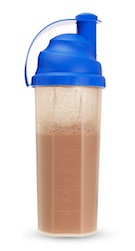Protein for Endurance Athletes
When you mention protein to endurance athletes – they often look at you blankly and say 'pass me the carbs'. However, as an expert in sports fuel will tell you, protein isn't just for weight trainers – it's also essential if you want to enhance endurance, recovery, well being, strength and ultimately – smash your PB's! Check out the protein facts below and see why a serving of protein goes well with the carbs!
Why do endurance athletes need protein?
 Protein is often referred to as a building block and its amino acids really are essential for repair and growth of muscles and key functions such as our immune systems. When you're training hard tissue turn-over increases hugely, and that means a regular supply of quality protein is essential. Take a look at proteins key roles for athletes:
Protein is often referred to as a building block and its amino acids really are essential for repair and growth of muscles and key functions such as our immune systems. When you're training hard tissue turn-over increases hugely, and that means a regular supply of quality protein is essential. Take a look at proteins key roles for athletes:
- Aids muscle strength and power production
- Aid immune function
- Delivers amino acids to re-build damaged muscle cells
How much protein do I need?
The answer is much more than the 55g daily serving recommended by the FSA in the UK! There is a huge amount of research showing that this is sub-optimal by a long way for endurance athletes, who are more likely to need around 1.8g of protein per kg of body mass daily. What's more, for endurance athletes who also train for power and some muscle mass (such as your triathletes and footballers), boosting this to 2g/kg may be beneficial.
80kg runner = 1.8 x 80 = 144g of protein daily
90kg triathlete = 2 x 90 = 180g of protein daily
What happens if I don't eat enough protein?
Everyone has hectic days when eating this amount of protein is a drag – in fact sometimes it can be impossible from regular food if you have a mad schedule at work and with family commitments! However, the risk of too little protein can really stack up if you're not careful, including:
- Impaired muscle tissue and a loss of strength and power
- Elevated muscle soreness after training
- Weakened immune system and frequent common infections
What are the best sources of protein?
'Protein isn't protein' – and that means that proteins vary in quality and usability from food to food. The most nourishing proteins are considered to come from animal products, which are packed with a full spectrum of amino acids (both essential and non-essential). In contrast, veggie proteins have a weaker amino acid make-ups and are not as efficiently used to support hard-training athletes.
High quality proteins: eggs, meat, poultry, fish, dairy, whey shakes/bars.
Poorer quality proteins: nuts, beans, vegetables
What are the benefits of whey protein shakes?
Whey protein is completely natural and you can see it in natural yoghurt (it's the 'watery' part that sits on the top). However, whey protein supplements are the only way to get concentrated amounts of ultra-pure whey protein. High quality whey protein shakes (Protrient and Recovermax) are therefore a great way for athletes to benefit from the nutrient, which has been proven to have support and enhance performance in many ways:
Post training > Whey protein isolate has an ultra-fast digestion rate, which is proven to trigger better muscle repair after intense training. Protrient and Recovermax are also rich in the amino acid glutamine which is proven to support immune defences. These feature of quality whey mean it may be markedly preferential to other protein sources.
Before bed/between meals > Protein shakes are considered by experts to be an effective way to eat protein every 2-3 hours and before sleep for a supply of sustained recovery nutrition.
Whey protein fact file:
1 - Whey is one of the two key milk proteins (milk contains whey and casein). Whey is the protein of choice for millions of athletes and gym trainers seeking rapid recovery and performance.
2 - 1 serving of quality whey like Protrient contains protein levels equal to a regular chicken breast but is very low in fat.
3 - Whey is a complete protein with 'fast' characteristics which are ideal post-training
4 - Whey is superior in its amino acid make-up when compared to many foods like fish, beef and soya. Whey has an excellent biological value, meaning its protein is very usable for repair
5 - Whey protein is rich in essential amino acids and BCAAs, both of which are key nutrients for performance, recovery and immune strength.
6 - Whey is naturally rich in the amino acids glutamine and leucine, boosting its benefits on exercise recovery and repair.
Maxifuel high protein support with Biomax
Maxifuel has become a name to trust when it comes to protein supplements for athletes and offer extremely high quality across their Protrient whey protein and Recovermax products:
Completely independent quality tests – unlike most companies, Maxifuel screen for purity.
Highest quality nutrition – you're assured of the finest whey protein blends.
Money-back promise – not many protein shakes come with a 40 day guarantee.
Exclusive Biomax protein – found in Protrient and Recovermax drinks, Biomax whey blend has been uniquely designed for ultra-fast protein delivery, to kick-start recovery and repair.
You can now see why protein is as essential as carbohydrates if you're an endurance athletes!